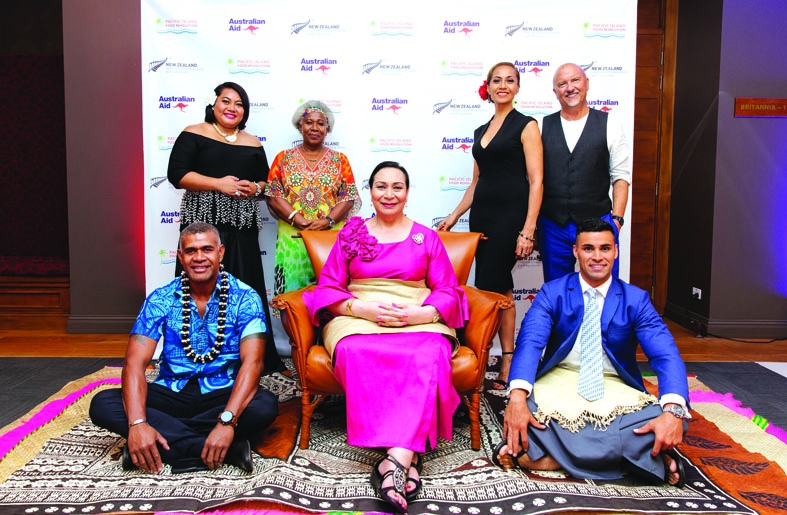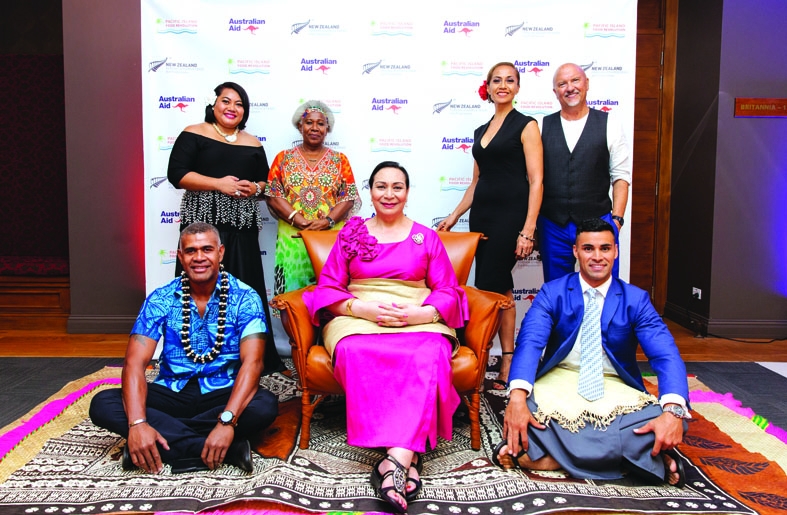The secrets of combatting noncommunicable diseases in our countries can be found in our Pacific Islands food cultures says Kiwi chef Robert Oliver on the eve of his new show, the Pacific Island Food Revolution.
Oliver has long been an advocate for traditional Pacific foods. His earlier tv series and cookbook explored how tourism and hotel menus could become “the business plan of a nation”, more truly reflecting Pacific diversity and values.
Now Oliver and his fellow Pacific Food Warriors have health in their sights through the new reality television series.
“We have four countries, Fiji, Tonga, Vanuatu and Samoa, and in each country we do two episodes. We begin with three teams in each country and throughout the episodes there is one team left…We’ve made our challenges address particular issues. So there is one in Fiji called greens because Fiji has these insanely high rates of anaemia, but you walk into Suva market and there are greens everywhere. In Samoa there is one called ‘colour of the rainbow’ which is around putting many colours on your plate, because colours indicate nutrients and we had the Fa’afafine community, because they’ve done work with the Ministry of Health in Samoa, to help socialise that awareness. And in Tonga there was one around Royal food, because there was a tradition of Royal food that was high status, so we created that to give Tongan food the same status that Royal food implies. My co-host in Tonga was her Royal Highness [Princess Royal Salote Mafile’o Pilolevu Tuita] so she really helped with that.”
Oliver says in the modern Pacific, many people opt to farm and fish, and then sell their expensive crabs, healthy fresh fish and farm produce in order to buy cheap tinned-fish and other processed food in the supermarket.
“We live in paradise and do not need foreign intervention to help us change, but rather can adopt the Pacific food culture to fight NCDs,” he says.
He says people eat junk food because it is convenient and cheap. “The cup of soup noodles is almost a benchmark for convenience and cost. They’re super cheap, they’re super easy but fundamentally, if you live on them you die. It just comes down to that…but you have to understand the real cost and one of the challenges of what we do is how do you say that without scaring people and putting people off.”
UNICEF Representative for Pacific Island Countries, Sheldon Yett, agrees. “People go to the lowest common denominator, salty noodles are cheap, they are available, they are heavily marketed, and people get addicted. Salt and sugar are addictive, that’s a tremendous challenge we have. We have to change habits, we have to change behaviour, that is not something that is done overnight. It’s done with constant reassessment and reinforcement and by those who influence people’s lives every day and that’s something we’re trying to do here.”
UNICEF is involved in the Pacific Island Food Revolution program through the “First 1000 days” challenge, and UNICEF Ambassador and Tongan Olympian, Pita Taufatofua co-hosts that episode. Yett says while NCDs are a huge and growing problem in the Pacific, so is stunting.
“A third of the population in the Pacific has a problem with stunting, that’s huge. That means that they are too short for their height. That’s because of nutrition and the interplay with their environment, it’s not because of their genes. So we are working to ensure that first of all, governments understand this, and that polices are in place. It’s really the first thousand days of a child’s life that are so important and that interventions have to be made, because after that, it’s irreversible. We are working to ensure that exclusive breast feeding is in place for the first six months, that pregnant mothers get access to good nutrition, [and] that babies have access to good nutrition and that does not include Coca Cola or juice.”
“We really need to engage people, we need to find a way to get some basic information to the communities, to individuals, to mothers to fathers, people in kitchens and we thought this avenue [the Pacific Island Food Revolution] is the perfect way of doing it,” Yett says. “Unlike other areas where stunting and malnutrition is a problem, there is no shortage of protein here, you are surrounded by it, and we want to make sure that people
go back to their roots and harness the proteins, the vitamins and the nutrients that are surrounding them and we want to do it in a way that cuts through, an entertaining way and also an informative and scientifically correct way, and we thought this is the perfect linkage.”
Apart from the reality television series (which Oliver describes as “like My Kitchen Rules but more warm-heated and filled with Pacific heritage and humour), the Pacific Island Food Revolution will also use the power of radio and social media to turn a mirror on the Pacific and show that eating fresh, local indigenous foods is the answer to good health.
“We do not want the show to be end of the story, it is the just the beginning,” Oliver says. “Behavioural change takes around eight years…We’ve been quite realistic, we’re not looking to have a dent in the health numbers for the first couple of years, it’s just ‘have we got people engaged and have we developed something that people want to be a part of?’ ”
- To find out more about the Pacific Island Food Revolution and
screening times, visit www.pacificislandfoodrevolution.com
- For the full interview with Robert Oliver visit www.islandsbusiness.
com
…..to read more buy your personal copy at

